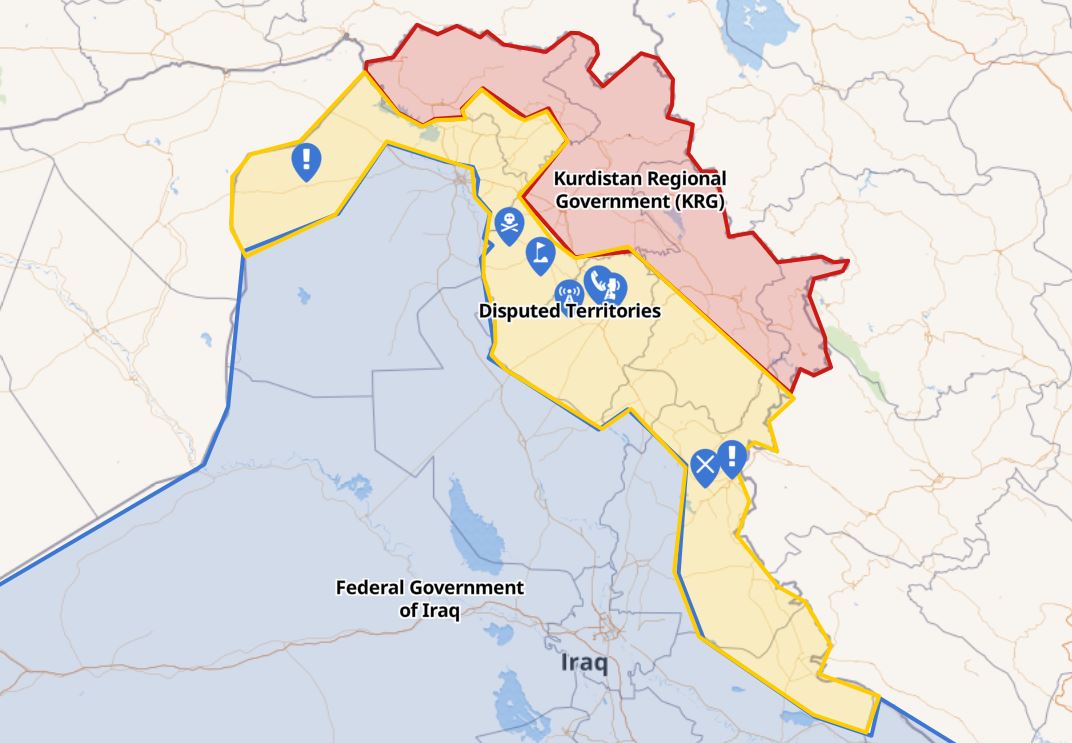1.2K
Kirkuk
- In an interview with the state-owned Iraqi News Agency, the acting governor of Kirkuk, Rakan Saed, said the Iraqi government has plans to arm the Arab tribes in Kirkuk to help the security forces after increased attacks by ISIS (Da’esh) in the province. Sead also said Iraq’s Prime Minister al-Kadhimi had formed a committee to investigate the province’s security breaches.
- Last Thursday, September 16, a delegation of the Peshmerga forces carried out a reconnaissance in the disputed areas between Erbil and Kirkuk. Both Erbil and Baghdad agreed to form two joint divisions consisting of the Peshmerga forces and the Iraqi Army to deploy in suburbs of the disputed territories where Da’esh is active. The combined forces will fill the security vacuum left by the Peshmerga forces since October 16, 2017, when Iraqi security forces, including Iranian-backed militias, removed the Kurds from the area in the aftermath of the Independence Referendum held by the Kurds. It is unclear where the joint forces will deploy before the parliamentary elections on October 10, 2021. The troops will deploy in Kirkuk’s Shwan, Perdi, Qara Hanjeer, Sargaran, Dibis, Layaln, and Daquq districts. The US-led Coalition will arm and train the joint divisions.
- Iraq’s Joint Operations Command (IJOC) released a statement clarifying “no changes” in areas where joint divisions will deploy. The IJOC said joint divisions are established for anti-Da’esh operations without new changes in the security authorities. In recent weeks, the Turkish-backed Iraqi Turkmen Front and the Arab Coalition have been spreading false information about the return of the Peshmerga forces and demanded Baghdad to prevent the Kurdish forces from returning.
- In a press conference, Loay Arkan, the head of the Independent High Electoral Commission (IHEC) of Kirkuk, announced that elections would take place in the province as scheduled without any delays. Arkan said that the IHEC is ready to hold elections, and Parliament designated the date, and any delays will be unconstitutional. Both Turkmen Front and the Arab Coalition called for postponing the parliamentary election in Kirkuk for a week. However, the IHEC formed a special committee from Baghdad to station and supervise the elections in Kirkuk. Though the IHEC Kirkuk staff and director will remain in position, the committee will have more authority over them, against the laws of the IHEC to form such a committee under the pressure of Turkish proxies. 232 candidates compete in Kirkuk’s three constituencies for 13 parliamentary seats, including a quota seat for the Christians. So far, 113 candidates have filed complaints about tearing down their posters amid high tension between the political parties and low expectations for election turnout.
- Business and stand owners at the public wholesale produce market (Alwa) protested against the Ministry of Municipality for imposing a levy via an investing company. The protesters burned tires and blocked roads demanding reform on the “high” levy, which will obligate business owners to raise prices of their goods by 20%.
Khanaqin
- The Iranian-backed militia, Asa’ib Ahl al-Haq prevented Kurdish candidates from launching campaigns and hanging posters in Jalawla (Golala), claiming the town “isn’t stable” and campaigning “will stir tensions.”
- Despite Baghdad and Erbil reaching an agreement for Kurdish security forces (Asayesh) to operate in Khanaqin, the Diyala Operations Command does not allow them to carry weapons but only share information with the police. The Kurdish officials said it appears Baghdad has reneged on the agreement.
Makhmour
- As Da’esh continues to launch attacks daily and has a significant presence in the area, Iraqi forces plan to launch a military operation near the Qara Chokh mountain to target Da’esh hideouts and locations. Dozens of US airstrikes have targeted Da’esh terrorists, mainly on the Qara Chokh mountain since last year.
Shingal
- 25 Yazidi candidates are running in Shingal and its sub districts in the upcoming parliamentary elections, including seven competing for the one quota seat. The rest are hoping to win a seat outside of the quota. Many of the Yazidi candidates are backed by different non-Yazidi political parties, raising anger among the community for the laws that allow that. Furthermore, the Yazidi religious leader (Baba Sheikh) Ali Shiekh Alias visited Shingal for the first time since becoming the new leader, attempting to ease the community’s internal issues and division mainly caused the genocide they suffered by Da’esh in 2014.

